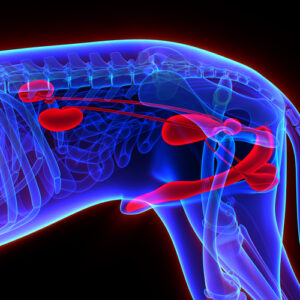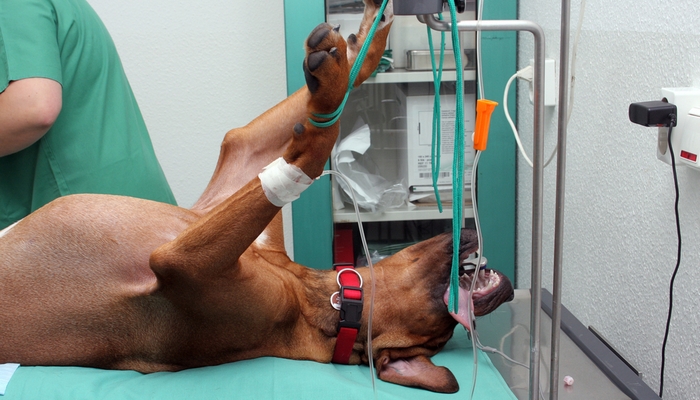The choice of neutering a dog is not an easy one to make. You can spend endless hours navigating the web, weighing pros and cons, deciding if it is a worthy decision, but, in the end, you will never be 100% sure. Some dog owners are nervous about putting their pet through a surgery that is not absolutely necessary.
While there are some drawbacks to neutering a dog, this procedure will have a lot of benefits, too. If you decide to go for it, you will most likely notice that your canine won’t seem so aggressive, and it will reduce his hostile sexual behavior, which is the second most common reason people neuter dogs (first one being reduction of dog population).
 Besides those noticeable changes, neutering a male dog will reduce the risks of prostate disorders and testicular cancer, while spaying your female dog will reduce uterine infections and, obviously, prevent unwanted pregnancies.
Besides those noticeable changes, neutering a male dog will reduce the risks of prostate disorders and testicular cancer, while spaying your female dog will reduce uterine infections and, obviously, prevent unwanted pregnancies.
But, neutering dogs is not all moonlight and roses. Health complications appear quite often. According to plenty of recent studies, health problems might include an increased chance of canine obesity, bone cancer and hypothyroidism, not to mention the surgery complications associated with anesthesia.
Recently, dog dementia has also been added to the list of possible complications resulting from neutering a pet. In this article, I'll be sharing some research with you that links this common dog surgery with cognitive impairments in male dogs specifically. It's certainly something to consider before you make the decision to have your dog ‘fixed.'
I also recommend you read a thorough science-based article on the pros and cons of neutering or spaying dogs that will have most of the information you need to know. In this article, I would like to specifically focus on the mental aspect of neutering dogs.
How Neutering Dogs May Lead to Cognitive Impairments
Cognitive Impairment in Dogs
It is already known that the older your dog gets, the more likely he will be affected by age-related cognitive changes. Cognition refers to the mental process associated with memory, learning and consciousness, which in senior dogs is often disturbed.
The number of dogs with cognitive impairments is increasing, mainly because of the rise in the canine lifespan; an increase in the number of older dogs also means an increase in the number of dogs with age-related dementia.
But age is not the only determinant in dog’s cognitive impairment. Neutering your dog may also prompt dementia.
 When researchers compared neutered senior dogs with intact ones, they found that castrated dogs had higher loss of house training, one of the most common symptoms of cognitive impairment. Cognitive impairments in dogs may also lead to disorientation in the home or yard, changes in social interaction with human family members and changes in the sleep cycles.
When researchers compared neutered senior dogs with intact ones, they found that castrated dogs had higher loss of house training, one of the most common symptoms of cognitive impairment. Cognitive impairments in dogs may also lead to disorientation in the home or yard, changes in social interaction with human family members and changes in the sleep cycles.
Even though there seems to be no differences in the acquisition of cognitive impairments, there are significant disparities in terms of disease evolution, between neutered and intact dogs. In the same conditions, non-castrated dogs do not show any signs of disease progression, while a significant percentage of neutered dogs evolved from being mildly impaired to being severely debilitated, according to the studies.
At the same time, a similar study showed that cognitive impairment is more frequent in castrated males than in spayed females.
Other cognitive skills, such as vision or hearing, are not affected by the neutering process, but they are definitely affected by age – just like in humans.
RECOMMENDED: The Truth – Is Anesthesia Safe for Dogs
Alzheimer’s-related Dementia in Dogs
It is known that older dogs often experience progressive behavioral changes that translate into disturbances in memory and learning processes.
These same symptoms are observed in humans with Alzheimer’s-related dementia, such as the accumulation of beta-amyloid plaques in the brain.
The aggregation of amyloid plaques in the brain has been proposed to trigger Alzheimer’s disease because it destroys the brain’s nerve cells.
Sexual Hormones in Dogs
 But why is this accumulation of beta-amyloid plaques more pronounced in neutered dogs? The most plausible explanation lies in dog's sexual hormones.
But why is this accumulation of beta-amyloid plaques more pronounced in neutered dogs? The most plausible explanation lies in dog's sexual hormones.
Estrogen, the female sexual hormone, improves cognition and memory, while testosterone seems to protect older men from developing Alzheimer’s disease.
The neutering process dramatically reduces the levels of circulating sexual hormones in dogs, thus depriving neutered dogs of the its protective effect.
As a consequence, beta-amyloid plaques will deposit more frequently, leading to Alzheimer’s-related dementia in dogs as well as other cognitive impairments.
The increase in the probability of dementia’s progression may seem like a small price to pay for the advantages of neutering your dog. Again, it all comes down to measuring pros and cons, weighing benefits and risks of neutering or spaying a dog. What seems undeniable is that alternative means of fertility control are needed.
Alternative Treatments to Neutering
One proposed alternative to neutering a dog is that glands, the organs that produce sexual hormones, are left intact in the neutering process. Hormonal replacement therapy can also be a substitute for the natural protective effects of sexual hormones.
These alternatives are especially crucial for working dogs, such as police dogs or disabled-assistant dogs, that strongly rely on cognitive skills to perform their tasks.
Before going through with the procedure, we also need to establish the right age of neutering or spaying a dog. It seems that majority of drawbacks from castrating a canine are more often related to the age of dog when the procedure is done rather than the surgery itself.
Just be sure to discuss these options with your veterinarian in detail before deciding which route is best for your Fido. Educating yourself on the matter first, so you have some arguments in this discussion with the vet as well.
RELATED PODCAST: Pros & Cons of Spaying and Neutering Your Dog















